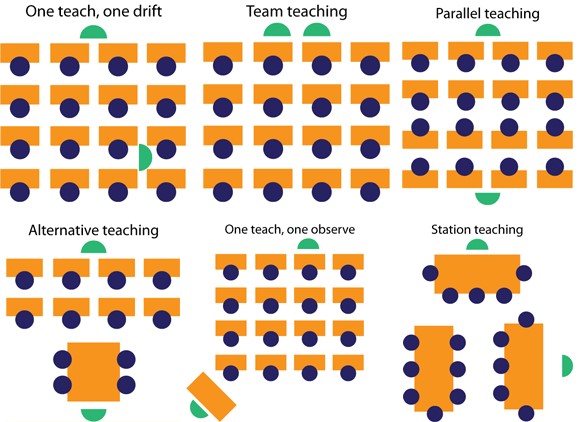Integrated Services addresses the special education and related services needs for students with disabilities identified under the Individuals with Disabilities Education Act of 2004 (IDEA 2004).
We have two different integrated services programs here at Wellington Middle School.
Multi-categorical: This program provides services to students with mild to moderate disabilities under many different categories of disability.
Integrated Learning Support (ILS): This program provides services to students with significant support needs.
InclusionAt Wellington Middle School we strongly believe in inclusion. Inclusion means that students are placed in classrooms with general education peers to the highest degree possible based on their individual needs. There are many benefits to being an inclusive program including: all teachers differentiate instruction to meet all students needs regardless of ability level, reducing stigma and building relationships, high expectations for all students, and has positive effects for all students in the classroom. This diagram gives a great visual of what inclusion looks like in a classroom and that is what we are striving for here at WMS!

Since we are an inclusive school many of our students services are provided in a co-taught setting. This generally looks like two teachers in the classroom, a content specialist and a special education teacher or para. Both teachers are equally responsible for the class but have special skills that they are the experts in. There are many benefits to co-teaching when it is done well. These include: More one on one interactions for students, all students access general education curriculum, all students access specialized instruction, increases student independence, and teachers build off of their own strengths and weaknesses as they work together.
Different models of co-teaching are shown in the diagram below:

Your student will experience these different styles of co-teaching, sometimes even within one class period.
The special education teachers role in a co-teaching model includes several key parts to support students with disabilities. These include: differentiate instruction, ensure accommodations are in place, provide specialized instruction, and advocating for student needs. The special education teacher also supports learning and instruction of all students in the classroom.
The expectations for co-teaching are that teachers collaborate and plan together during common plan periods, teachers communicate openly with each other, and both teachers are equally valued and respected in the classroom. Co-teaching relationships take time to develop but once they are established it creates an open and inviting learning space for all students
Family InvolvementOur integrated services department works hard to develop positive relationships with families. We work as a team to help students grow and obtain skills that are really challenging. We value open communication between teachers and family. Case managers are your go to contact with the school and we have worked hard to get creative at solving problems. If you need anything please don’t hesitate to reach out. You can help us out too! Help make sure your student gets to school when they are able. Attendance is so important for your student being able to make growth. We also will hold IEP meetings annually and re-evaluations every three years. Your input at these meetings is invaluable! No one knows your student better than you. In middle school we start to work hard to include students in their IEP meetings as well so that they can start to understand and advocate for what they need to be successful.
MissionWe will leave you with the Wellington Middle School integrated services team mission. Help every student obtain the academic, social/emotional, and life skills they need to be successful in whatever they desire to do once they are out of school.


